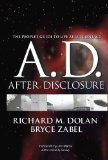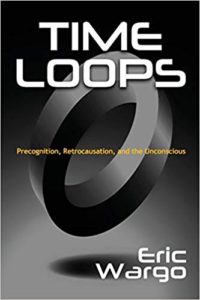“After Disclosure”
 The very next day after I wrote the previous post — about how we should just assume the reality and significance of the UFO phenomenon and proceed from there — what should arrive on my doorstep in an Amazon box but the new book A.D. After Disclosure
The very next day after I wrote the previous post — about how we should just assume the reality and significance of the UFO phenomenon and proceed from there — what should arrive on my doorstep in an Amazon box but the new book A.D. After Disclosure, by Richard Dolan and Bryce Zabel. It is a book-length argument for, yes, assuming — based on the mountains of evidence that now exist — that UFOs are real and that public confirmation of the existence of alien beings here on earth is only a matter of time. (What “alien” means is, of course, not yet clear, although as I argued previously, in a sense it doesn’t really matter.)
This is a thrilling, landmark book, the first in what will inevitably be the next, post-Fortean phase of ufology — i.e. when it becomes a subject of legitimate study within the mainstream. The implications of disclosure/contact are staggering, and the authors map out, with great intelligence and forethought, what the world will look like after it happens — very likely in our lifetimes. It will be the biggest story in history, and its repercussions will be felt in every aspect of our society.
A.D.: After Disclosure is the capper in what has been a fantastic year in ufology, with some of the best, most serious books ever written on the subject: Leslie Kean’s UFOs: Generals, Pilots and Government Officials Go On the Record, Jacques Vallee’s brand new Wonders in the Sky: Unexplained Aerial Objects from Antiquity to Modern Times
, as well as James Fox’s documentary I Know What I Saw
and Mac Tonnies’ highly speculative but also paradigm-bending The Cryptoterrestrials
. Bringing ufology out of the Fortean ghetto is the best thing that could possibly happen for the field. It seems to finally be happening.
My Amazon review of A.D. is reprinted on the authors’ Web site.




“post-Fortean phase of ufology — i.e. when it becomes a subject of legitimate study within the mainstream.”
&
“Bringing ufology out of the Fortean ghetto is the best thing that could possibly happen for the field. It seems to finally be happening.”
Much as I enjoy your blog and acknowledge its importance within academia, I’m puzzled about why Fortean has to be a negative term – I’m almost certain that some of the writers concerned would be equally puzzled, if I take them at their word.
I think a better way of seeing it is that, like the academic study of occultism and the western esoteric traditions, perhaps we should be doing what Fort, Keel, Vallee and others have done and be more literal, i.e., look at it phenomenologically and historically, distinguish the emic from the etic.
I’ve taken ufology as seriously as I have the debunkology because both have pre-determined positions that ignore evidence. And I’ve certainly never thought of ufology as Fortean in the classic sense.
I’d much rather hope that the Fortean will be brought out of the ghetto of the cultic milieu dominated by UFO religions and the skeptics, and lifted back into it’s philosophically phenomenological place. Researchers like Tonnies and Redfern are a good sign that this is taking place.